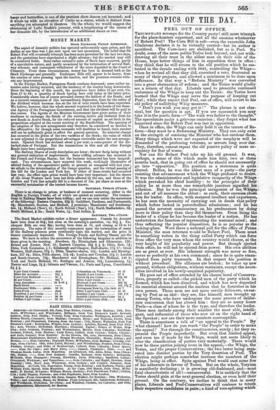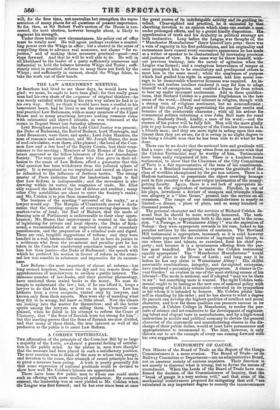TOPICS OF THE DAY.
PEEL OUT OF OFFICE.
TRIUMPHANT revenge for the Country party! still more tritunph for the place-hunters expeotant, and all the enemies whatsoever of Robert Peell The Corn Bill is safe—even the venerable John Gladstone declares it to be virtually carried—but its author is sacrificed. • The Corn-laws are abolished, but so is Peel. No doubt, some of the more politic Tories look beyond, and, not with- drawing all their trust in the ablest man on their side of the House hope better things of him in opposition than in office : they think that he will return to the 61 position which he sus- tained in the decade ending with 1841, controlling the Whigs— when he revised all that they did, exercised a veto frustrated so many of their projects, and allowed a minimum t; be done upon sufferance. In that way. a "Reform Ministry" was converted into a great obstruction of reform - and the Tories would gladly see a return of that day. Liberals used to prescribe continued - endurance of the Whigs to keep out the Tories: the Tories have learned that the Whigs may serve the purpose of keeping out Peel ; while they expect that Peel, out of office, will revert to his old policy of nullifying Whig measures. " Don't you wish you may get it?" The phrase is not clas- sical, but the question is apt. If you are squeamish you may take it in the poetic form—" The wish was father to the thought.' The speculators make a grievous omission ; they forget what has happened since Sir Robert Peel was last in opposition. Once in office' the Whigs can only hold it on the tenure of Re- form—they must be a Reforming Ministry. They can only exist on the strength of outdoing the Minister who has outdone them. Many things which were not expected of the neophyte will be demanded of the professing veterans, as arrears long over:dne. They, therefore, cannot repeat the old passive policy of mere oc- cupancy for fear of worse. Nor can Sir Robert Peel take up his old ground. It was, perhaps, a sense of this which made him hint, two or. three months back, that in going out of office he-should not necessarily go into "opposition." His position as a statesman is quite. altered. Before he was the ablest man of a party—the party resisting that advancement which the Whigs professed to desire. It was the administrative and legislative incapacity of the Whigs which provoked his chief hostility : to the principles of their policy he at more than one remarkable juncture signified his ,
adhesion. But he was the principal antagonist of the Whig°, and out of all measure the ablest : as such, their enemies chafe him for leader. In office, with matured intellect and experience, he has seen the necessity of carrying out in deeds that policy which before lurked in parenthetical admissions ; and he has passed the severest commentary on his predecessors by doing - more in their policy than they did themselves. From being the leader of a clique he has become the leader of a nation. He has undertaken the function of representing the nationa1mind ; and thus reflecting the popular disposition, he is as popular at the looking-glass. Were there a national poll for the office of Prime Minister, the man returned would be Robert Peel. There must
be something rotten in the thing called Party which can force from office the very man whom the country would choose, at the' very height of his popularity and power. But though ejected from office, he will not be ejected from power. His own abilities are as great as ever. His inheie,nt strength was never so free, never so perfectly at his own coMmand ; since he is quite eman- cipated from party trammels. In that respect his position is without precedent. His alliances are broken; he takes up new ground, without obligations, without restraints, except the-neces- sities involved in his newly-acquired popularity. He goes out of office attended by his chosen band of Conserva- tives, properly so called—the picked men of the party which he formed, which has been dissolved, and which has now deposited its essential element around the nucleus that he furnishes in his own person. Those men are not mere servile followers, swear- ing by Peel as an idol : they are, like himself, men brought up among Tories, who have undergone the same process of delibe-
o
rate conversion that has altered him : they are so many lesser Peels—a class of whom he is the type and therefore the leader. These men include among their number the most able intelli- gent, and influential of those who now sit on the right hand of
the Speaker; nor are their mere numbers contemptible. ..
There is sometimes a talk of "an appeal to the People." By what channel? bow do you reach "the People" in order to make the appeal ? Not through the constituencies, surely.; for they re- present the People imperfectly. But even that limited appeal, and even too if made by the Whigs, would not seem likely to alter the classification of parties very materially. There would now be three parties joining issue in the appeal,—the Whigs, the Tories, and the proper Conservatives ; the two latter being sepa- rated into distinct parties by the Tory desertion of Peel. Th i e election might perhaps somewhat increase the numbers of the Whigs, being in office. Spite against Peel would oust some few of his adherents in favour of Tories. But on the whole, Toryism is manifestly declining ; it is growing old-fashioned, and—most fatal characteristic of all 1—unsuccessful. It is unlikely that the Tories should gain at the next general election, or even hold their ground. On the contrwy, we incline to think that in many places, Liberals and Peel-Conservatives will coalesce to return their respective candidates in pairs; a kind of vote-splitting which will, for the first lime, not/neutralize but strengthen the repre- sentation of many places for-allquestions of present importance. So far, then, as Sir Robert Peel's section of the House is con- cerned, the next election, however brought about, is likely to augment his strength. Under these totally new circumetances, his policy out of office must be totally new. He will again perhaps exercise a control- ling power over the Whigs in office ; but a control in the sense of compelling them to advance real measures, not shams " for re- jection," and of making those measures practical—good—real steps forward. And that he will -be well able to do. He will in aiflikelihood be the leader of a party sufficiently numerous and influential to hold the balance between Whigs and Tories ; suffi- ciently tried in practical reforms to assay those put forth by the Whigs ; and sufficiently in earnest, should the Whigs falter, to take the work out of their hands.



























 Previous page
Previous page